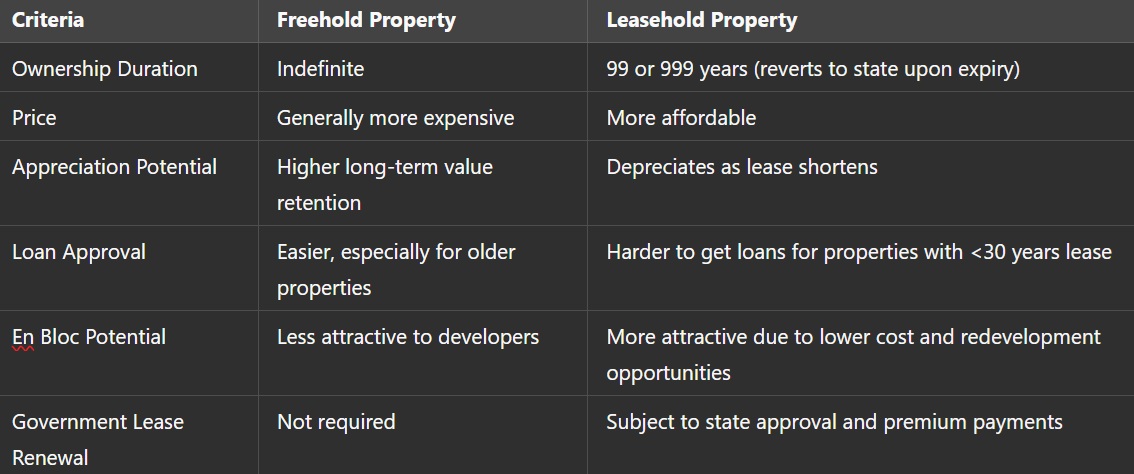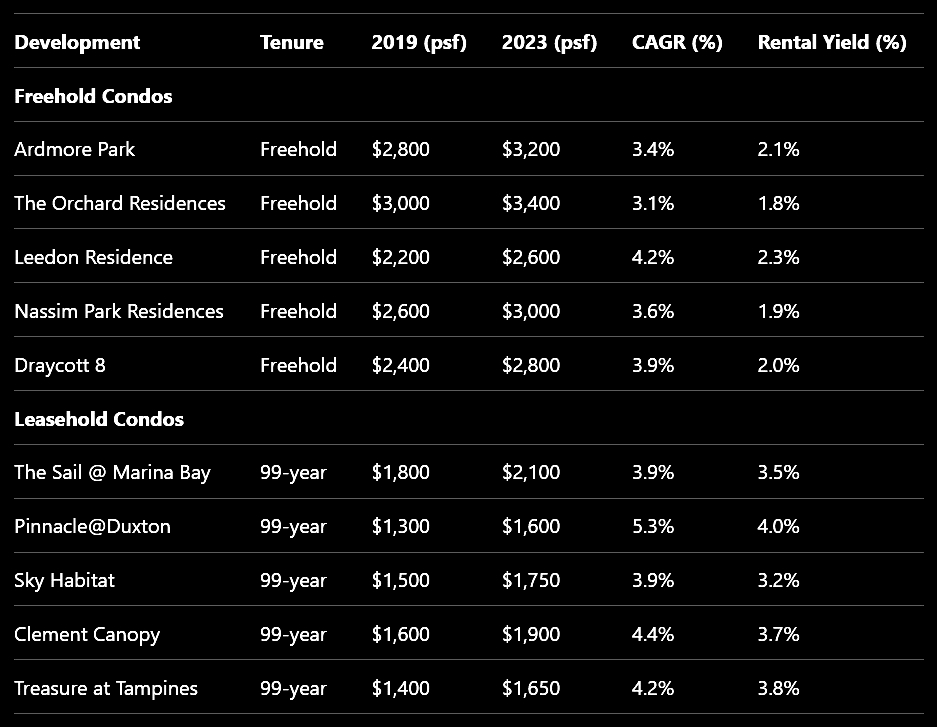- Home
- Freehold vs Leasehold Property in Singapore: Which One Should You Choose?
Freehold vs Leasehold Property in Singapore: Which One Should You Choose?

When purchasing a property in Singapore, one of the most important considerations is whether to opt for a freehold or leasehold tenure. The tenure type can significantly impact the property’s value, appreciation potential, and resale attractiveness. This article explores the differences between freehold and leasehold properties, their pros and cons, and factors to consider when making a choice.
Understanding Freehold and Leasehold Tenures
Freehold Property
Freehold properties grant the owner indefinite ownership of the land. In Singapore, freehold properties typically fall under two categories:
Estate in Fee Simple: The most absolute form of ownership with no restrictions on duration.
Estate in Perpetuity: Similar to fee simple, but usually granted for properties originally under state ownership.
Leasehold Property
Leasehold properties, on the other hand, are owned for a fixed period, typically 99 years or 999 years. When the lease expires, the land reverts to the state unless the lease is renewed, which is subject to government approval.

Price & Profitability Comparison: 10 Condos (2019–2023)
Below is a summary of average price per square foot (psf) and profitability metrics for 5 freehold and 5 leasehold condos. Data is illustrative and based on historical trends.

Key Findings
Price Appreciation:
Freehold condos saw moderate growth (3–4% CAGR), benefiting from scarcity.
Leasehold condos outperformed in some cases (e.g., Pinnacle@Duxton at 5.3% CAGR), driven by location and affordability.
Rental Yields:
Leasehold properties averaged 3.6–4.0% yields, appealing to investors.
Freehold yields lagged at 1.8–2.3%, as buyers prioritize capital gains.
Resale Demand:
Older leasehold projects (e.g., The Sail) face slower growth as leases shorten.
Freehold properties like Ardmore Park remain sought-after for legacy planning.
Pros and Cons of Freehold and Leasehold Properties
Freehold Property
Pros:
Ownership is permanent, ensuring generational wealth transfer.
Retains value better over time.
Easier to sell, as buyers and banks prefer longer tenure properties.
No lease expiry concerns.
Cons:
Higher upfront cost.
Lower en bloc potential, as developers prefer cheaper leasehold land for redevelopment.
Leasehold Property
Pros:
More affordable entry price, making homeownership accessible.
Higher rental yield due to lower purchase price.
More en bloc potential, offering windfall opportunities for owners.
Cons:
Property value declines as lease runs down, especially after 40 years.
Harder to secure bank loans and CPF usage for properties with <30 years lease.
Potential lease expiry without renewal means ownership is not permanent.
Factors to Consider When Choosing Between Freehold and Leasehold
1. Budget and Affordability
Freehold properties come at a premium. If your budget is tight, a leasehold property might offer better value for money.
2. Investment vs Own Stay
If you are buying for long-term investment or legacy planning, freehold properties offer stability and value retention.
If you are looking for rental yield or potential en bloc gains, leasehold properties may be the better option.
3. Property Age and Loan Eligibility
Older leasehold properties with short leases (<30 years) may not qualify for full bank loans or CPF usage.
Freehold properties remain attractive for financing regardless of age.
4. Location and Demand
A well-located leasehold property in a prime area can be more valuable than a freehold property in a less desirable location.
Consider the potential for appreciation and rental demand.
Conclusion
Both freehold and leasehold properties have their own advantages and disadvantages. The choice depends on your financial situation, investment horizon, and property goals. If you seek long-term ownership and stability, freehold may be ideal. However, if you prioritize affordability, rental yield, or en bloc potential, leasehold properties can be a strategic choice.
Before making a decision, it’s advisable to consult a real estate professional to assess your needs and guide you toward the best option based on market conditions and financial considerations.